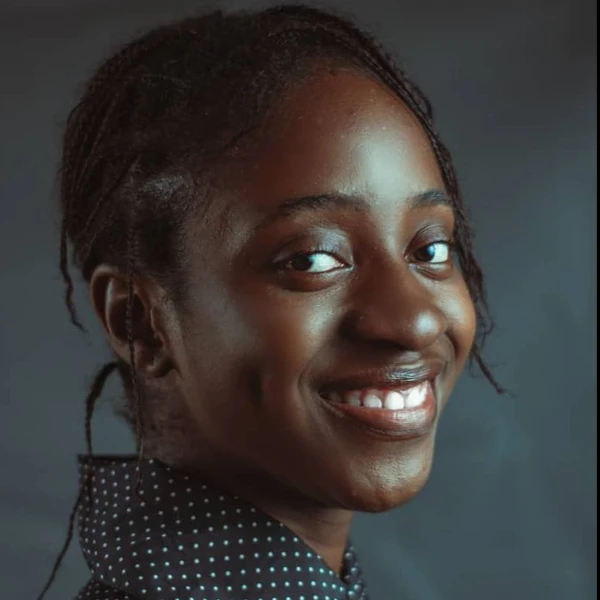
Hobbies and interests
Bible Study
Choir
Piano
Reading
Psychology
Thriller
I read books multiple times per month
Mobolaji Akande
1,165
Bold Points1x
Finalist
Mobolaji Akande
1,165
Bold Points1x
FinalistBio
I'm a passionate learner curious to understanding the merge between design and psychology and how we can make people's experiences of the digital world healthier
Education
Salem College
Bachelor's degree programMajors:
- Visual and Performing Arts, Other
- Psychology, General
Minors:
- Music
Miscellaneous
Desired degree level:
Doctoral degree program (PhD, MD, JD, etc.)
Graduate schools of interest:
Transfer schools of interest:
Majors of interest:
Career
Dream career field:
Mental Health Care
Dream career goals:
Food service worker
Harvest Table Salem College2023 – Present3 years
Arts
Salem college
Drawing2025 – 2025
Public services
Volunteering
National Social Investment Programme — Assessor2022 – 2022Volunteering
Project Skyline — Worker2024 – 2024
Future Interests
Volunteering
Philanthropy
Entrepreneurship
Marsha Cottrell Memorial Scholarship for Future Art Therapists
While some people find healing in the words and comfort of those around them, I discovered mine in colors and sounds. Before I ever knew the term “art therapy,” I had already lived it. I grew up in an environment where awareness of mental well-being was almost nonexistent. Conversations about emotions, therapy, or self-care were rare, and they were often met with misunderstanding or stigma. Alongside this, there was little appreciation for art as anything more than a hobby, let alone a tool for healing.
I didn’t know that art therapy even existed until I unknowingly experienced its power myself. As a teenager, I struggled to express myself the way I truly wanted. There were moments when I felt emotions so deeply, yet couldn’t find the words to explain them. During those times, I found myself drawn to drawing and music. These became my outlets where I could process my feelings, release my thoughts, and finally understand what was going on with me or what I was feeling.
It was only later that I learned art therapy and music therapy are recognized specialties in psychology, used worldwide to help people heal. This discovery ignited my curiosity. I began to explore the different ways art has been used to help individuals recover from trauma, improve relationships, and build healthier versions of themselves.
The more I learned, the more I saw its potential in my own community.
In Nigeria, where I come from, professional mental health services are still heavily stigmatized. Many people shy away from counseling or therapy because they fear being judged. Yet, I realized something, if you invite a couple to a “paint and sip” event, they may happily attend. But what if that same event was designed in a way that also provided subtle, guided conversation and emotional connection? It could serve as an entry point to what is, in essence, couples therapy without the intimidating label.
This is not to say that traditional therapeutic methods are ineffective. Rather, in a society where mental health is still misunderstood, blending professional care with the arts creates a softer, more inviting path toward healing.
I dream of bringing this approach to my community in Nigeria. I envision safe spaces where people can paint, create, and express themselves, while gently dismantling the stigma surrounding mental health. Through art, I believe we can spark conversations, encourage help-seeking behavior, and remind people that healing can be as colorful as the canvas they paint on.
Good Vibes Only Scholarship in Memory of C. Spoon
I grew up in NIgeria with my house being very close to a psychiatric hospital. Curretly, in my country, there is still a stigma that surrounds mental health and getting treatment, which is one of the reasons I came to study here in the Uinted states. Merely living beside a psychiatric hospital would attract cerrtain looks from people, however, I always had this notion that just as anyone can develop a physical sickness, anyone can develop a mental illness. This fueled a desire to gain adequate professional knowledge to be able to practice psychology as it should and also encourage an awareness on the importancce of mental wellbeing in my community.
Getting to the United States, I have met a few if not a lot of black people trying to somehow reconnect with their roots in Africa while also understanding that they have roots in this country too. Identity conflict, transgenerational trauma and so many issues surrounding the black community aren't really spoken of and treated as should be. These issues reflect themselves subtly in the maladaptive behaviors sometimes stereotyped to the underrepresented. Two Individuals with unresolved struggles come together to form a family and the couple raise their child(ren) with their dysfunction, hence having a child brought up with dysfunctions. The child meets other children and is confused about why he/she seems so different yet can't identify why. The child either suppresses it, acts out or resolves it with external help. With limited access to mental health services and the stigma surrounding getting help, I'm afraid there's higher chances of the child suppressing or acting out. Hence, we have a higher population of people who second guess themselves and people who try to rebel against norms and rules in response to their internal struggles. They grow up, maybe get married and the cycle repeats itself over and over again.
If more investments are made into psychology and these issues surrounding the BIPOC communities, I believe many individuals would come to a place of having an identity, many homes will be healed of dyscfunctions and issues like domestic abuse, child trafficking, drug abuse and so on would have a drastic reduce. On a larger scale, national issues like the increase in crime rate, violence, drug traffficking would get a gradaual reduction in long term. Perhaps people have seen it, perhaps they are yet to see it, I strongly believe our mental wellbeing as a big role to play in the total wellbeing of a community, the state and the country at large.